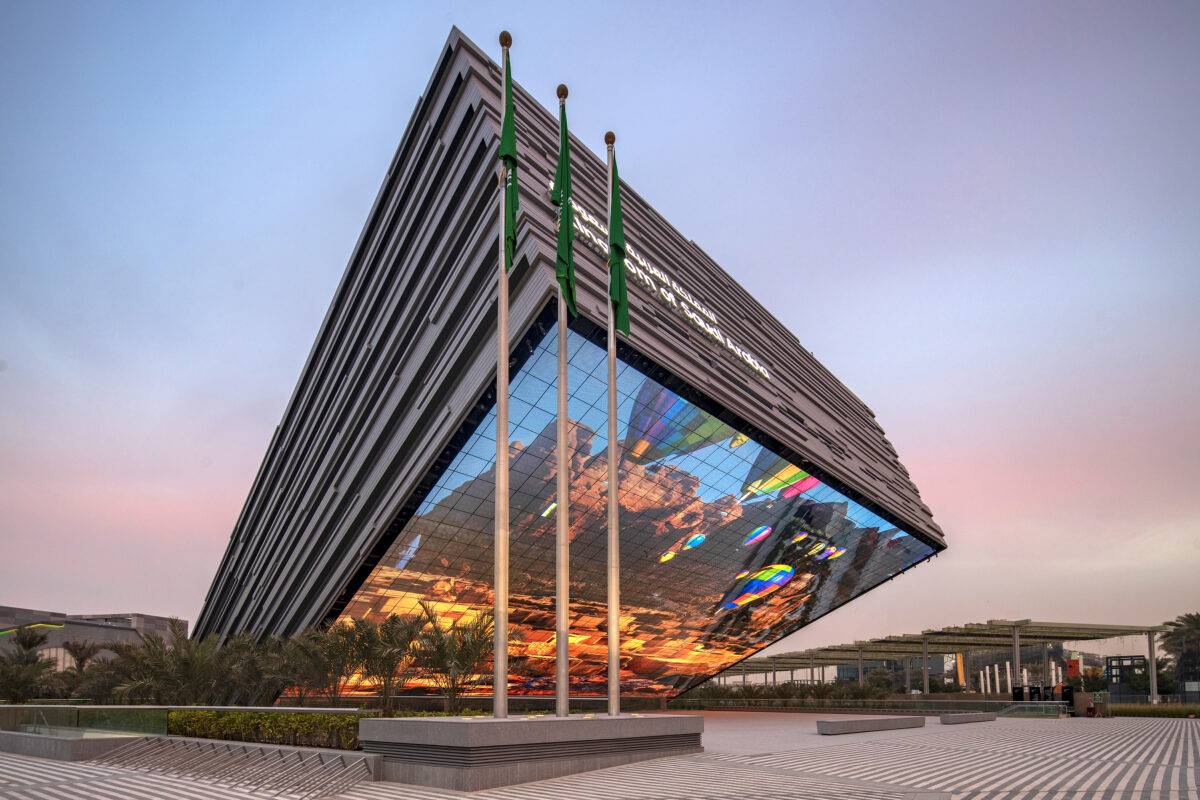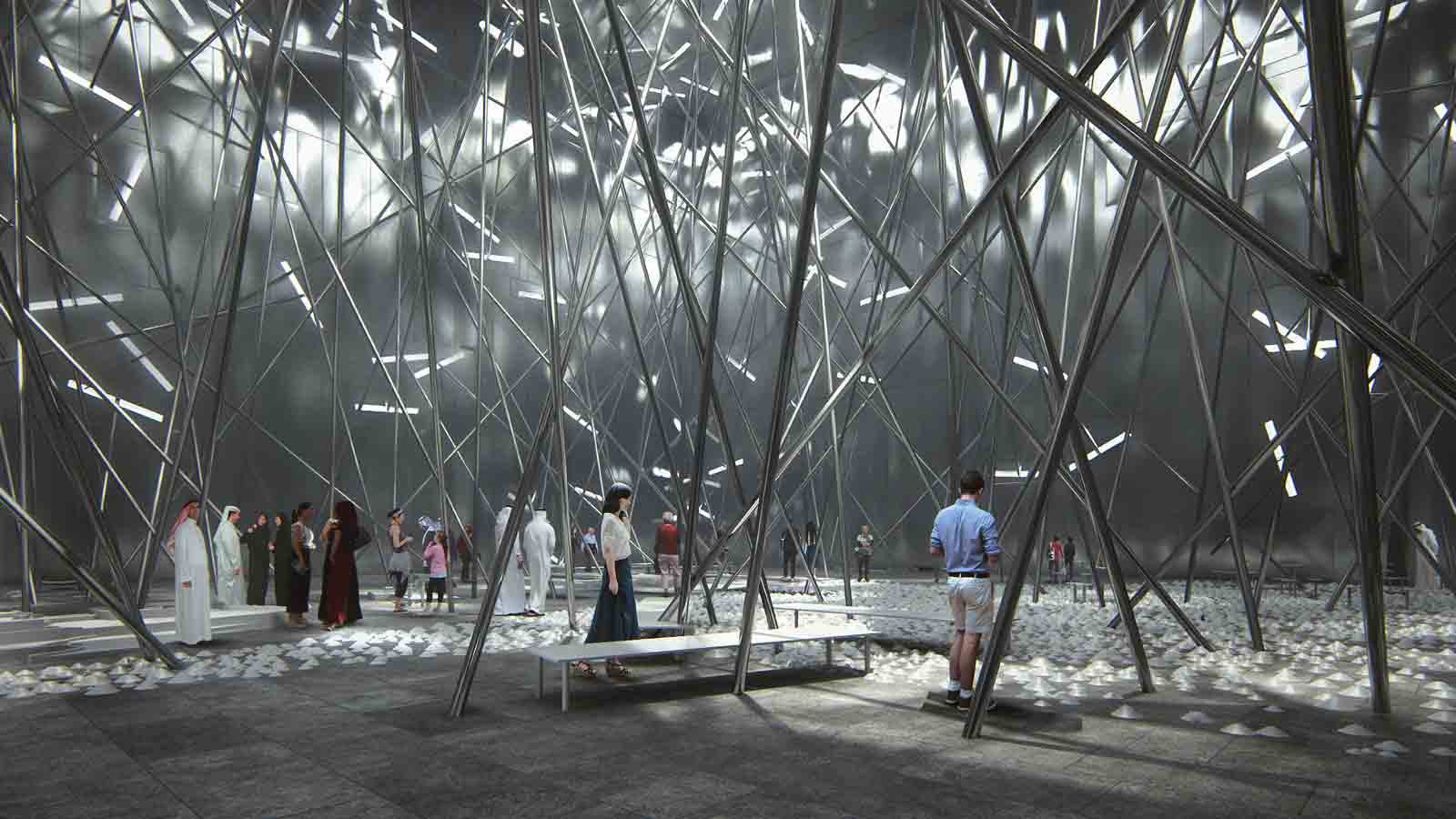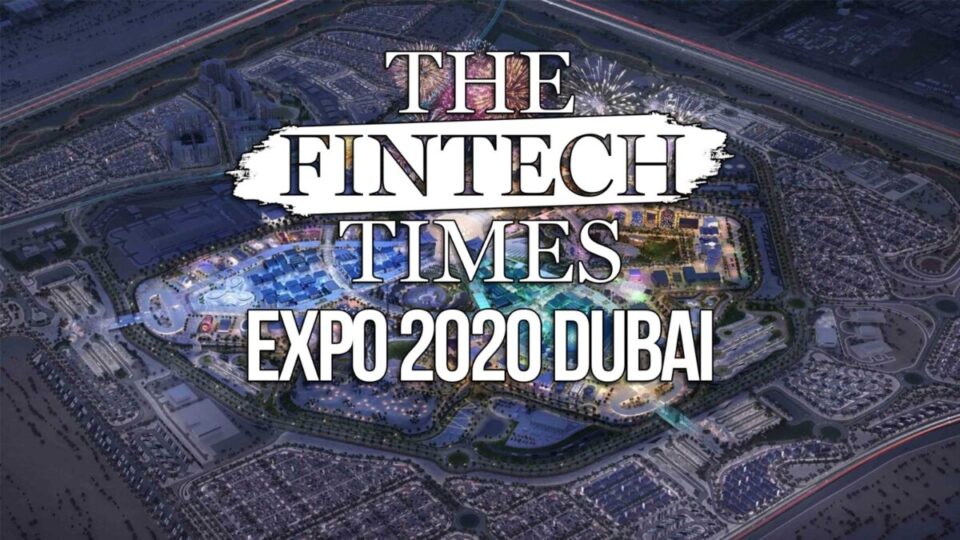Expo 2020 Dubai is showcasing innovations across its themes of opportunity, mobility and sustainability. Countries from across the world are taking part and highlighting their wider economic development. And today we take a visit to the pavilions of Saudi Arabia and Bahrain.
In terms of the financial services industry and specifically fintech and wider digital, how is Expo 2020 Dubai spotlighting countries such as Israel and Thailand? The first expo or world’s fair in the Middle East, Africa and South Asia (MEASA) is making headlines and bringing people from across the world to learn more about opportunity, mobility and sustainability.
SAUDI ARABIA
The Saudi Pavilion is among the most visited pavilions at Expo 2020 Dubai. By 18 November, the landmark pavilion recorded its one-millionth visit since it opened on 1 October, nearly a third of all Expo visits combined.
The key pillars of People, Opportunity, Heritage, and Nature – underpin Saudi Arabia’s participation in this international mega-event taking place in the Middle East for the first time ever.
Visitors are set to experience a state-of-the-art, immersive experience, in an open invitation to explore the country’s rich heritage, diverse people, vast opportunities, and natural wonders.

The KSA Pavilion has a unique design. The innovative façade of the building soars five stories high. The structure is prism-shaped and its base represents modern Saudi society with its deep-rooted history; and as it soars skywards, it symbolises the limitless ambitions of our nation. The five-story structure is the largest guest pavilion at the Expo, covering a 13,069-square-metre area, which is approximately the size of two football fields.
The KSA Pavilion is one of the most sustainable structures at Expo 2020 Dubai, with more than 40 per cent of the materials used sourced from sustainable sources and over 80 per cent of the waste from construction recycled.
The state-of-the-art building fuses architecture with digital technology and has been awarded LEED version 4 Platinum rating from the US Green Building Council (USGBC) – the highest internationally recognised sustainability rating in Leadership in Energy and Environmental Design.
Aligned with global sustainability norms and a clear environmental vision, the eco-friendly structure boasts hundreds of solar panels manufactured in the Kingdom.
The KSA Pavilion has also won three Guinness World Records for:
- Largest interactive lighting floor with around 8,000 LED lights
- Longest interactive water feature at more than 32 metres
- Largest LED interactive digital mirror screen at more than 1,302-square-metres

“Saudi Arabia’s participation at Expo 2020 Dubai is in line with Saudi Vision 2030 and seeks to strengthen the goals of our national transformation plan, one of which is for Saudi Arabia to become a global investment powerhouse, and to transform the Kingdom’s economy into the 15th largest globally, up from rank 19 today,” comments Hussain Hanbazazah, Commissioner General of the Kingdom of Saudi Arabia Pavilion at Expo 2020 Dubai
“Digital transformation is a key segment of Vision 2030, which aims to build a high-technology knowledge economy that is well-diversified beyond dependence on oil. Upgrading the Kingdom’s digital capabilities will empower the citizens of the future and equip businesses and partners with the tools necessary to drive growth, agility, and competition.
“Under Vision 2030, Saudi Arabia aims to be one of the top e-governments globally and strives toward becoming one of the world’s top 20 digitally innovative nations. A robust digital infrastructure is a central pillar to the Kingdom’s future development. It attracts investors and boosts the competitiveness of the Saudi economy, while providing greater access to goods and services for all citizens”
THE WIDER DIGITAL ECOSYSTEM IN SAUDI ARABIA
As a nation, the Kingdom of Saudi Arabia is undergoing a journey of transformation under its Vision 2030, the long-term roadmap to further diversify its economy beyond reliance on oil revenues.
Saudi Arabia’s participation at Expo 2020 Dubai is in line with Saudi Vision 2030 and seeks to advance the goals of our national transformation plan.
One of the key objectives of Vision 2030 is for Saudi Arabia to become a global investment powerhouse, and to transform the Kingdom’s economy into the 15th largest globally, up from rank 19 today.
The Saudi pavilion has been designed to support these objectives. At the Pavilion’s ‘Discovery Centre,’ visitors can uncover thousands of data points at the ‘Economy and Investment’ pod that invites visitors to learn about how Saudi Arabia is opening up on an unprecedented scale and how foundational reforms are making our economy more competitive.
In the ‘Business Park’, an innovative platform, the KSA Pavilion aims to connect business leaders and investors from around the world to forge exciting partnerships and discuss investment opportunities.
With an electronic window featuring 2030 scenographic crystals symbolising Saudi Vision 2030 roadmap for the future, the pavilion showcases important current mega projects, such as Qiddiya, Diriyah Gate Development, Red Sea, and other projects based on environmentally friendly concepts, such as King Salman Park, Saudi Green Initiative and Green Middle East Initiative.
DIGITAL INFRASTRUCTURE IN SAUDI ARABIA
The Kingdom has a robust digital infrastructure, which is helping accelerate the digital transformation already underway. Saudi Arabia has been ranked among the top ten developed countries globally for its robust digital framework, according to the Unified National Platform GOV.SA website.
The Kingdom has improved the quality of digital services provided to beneficiaries by partnering with the private sector to provide fibre-optic network coverage to more than 3.5 million homes across the Kingdom, increasing internet traffic during the Covid-19 pandemic by 30 per cent, doubling the internet traffic through the Saudi Arabian Internet Exchange (SAIX), increasing the internet speed from 9Mbps in 2017 to 109 Mbps in 2020.
The Kingdom was named the ‘Top Digital Riser’ among the G20 nations due to the comprehensive government support for digital transformation in the Kingdom, as part of Vision 2030.
In Saudi Arabia the infrastructure is suitable for fintech ecosystems to thrive as the country has been globally considered to have a successful e-Government programme; it ranked very high on the Online Service Index (OSI) and high on the e-Participation Index (EPI) in the UN e-Government surveys.
At nearly 90 per cent, the mobile penetration rate in Saudi Arabia is quite high and the country boasts a highly educated population has a high level of acceptance of technological changes with more than 30 million people, or 90 per cent of the population, being active Internet users, and many of them also active on social media. Many Saudis use digital banking services, including online banking and mobile banking.
In March 2021, Saudi Arabia’s Council of Ministers approved the establishment of the Digital Government Authority (DGA), concerned with everything related to digital government. It aims to regulate the work of digital government in government agencies, in order to reach a digital and proactive government capable of providing highly efficient digital services and achieving integration in the field of digital government among all government agencies.
In August 2021, the DGA board of directors approved the first regulatory framework of the digital government which will be the basis on which the authority will develop future regulations for the digital government. The framework includes a set of principles, policies, standards, and user guides.
FINTECH IN SAUDI ARABIA
Saudi Arabia has put in a place a National Fintech Strategy. This strategy covers 25 work programmes to boost the country’s fintech sector. In Saudi Arabia, the fintech sector is largely driven by younger, first-generation entrepreneurs. There are more than 40 incubators and accelerators.
Other key initiatives include ‘Taqadam’ Accelerator Programme, as well as Fintech Lab, Regulatory Sandbox Framework, and Fintech Saudi. Another Vision 2030 initiative was created in 2017 by the National Digital Transformation Unit (NDU) – governed by a high-level committee that includes six government ministers and other key entities – which works with digital transformation partners to accelerate and enable digital transformation in the Kingdom.
The fintech industry has seen significant growth in recent years in the Kingdom, which has one of the highest rates of fintech adoption in the region and has seen a big increase in the number of operating fintech companies that have attracted over SAR1.3 billion in venture capital investment.
A broad array of investors support fintech companies in the Kingdom, which highlights the attractiveness of the Saudi fintech industry. They include local and international venture capital firms and investors, corporate-backed venture funds, angel investor groups and international corporates. However, there is significant room for growth in the size of funding rounds for local fintech firms.
The Kingdom aims to further develop its financial sector in line with Saudi Vision 2030 and the Financial Sector Development Programme (FSDP), one of the Vision’s 12 Executive Programmes.
Launched in 2017, FSDP aims to develop a diversified and effective financial sector to support the development of the national economy, diversify its sources of income, and stimulate savings, finances and investments.
Under the FSDP programme, the Saudi Central Bank (SAMA) and Capital Market Authority (CMA) launched Fintech Saudi in 2018 to develop the fintech sector in the Kingdom. Fintech Saudi’s ambition is to transform the country into an innovative fintech hub with a thriving and responsible fintech ecosystem and promote fintech through education, training, and increasing public awareness.
In line with Vision 2030, which seeks to boost economic growth and investments, the Saudi Central Bank (SAMA) has said in 2019 that it launched a Regulatory Sandbox for local and international firms to test new digital solutions in a ‘live’ environment and to assess the impact of new technologies in the Saudi financial services (FS) market, as well as to help transform the Saudi market into a smart financial centre.
SAMA’s Regulatory Sandbox aims to attract local and international fintech businesses that are looking to leverage existing or new technology in an innovative way to deliver new financial products or services to Saudi markets or improve business processes.
One of the commitments under FSDP, 30 emerging companies such as financial technology companies will be enabled to drive innovation and competition by 2025.
Over the last year, new fintech companies have emerged in a variety of areas including payments, capital markets, insurance and business tools for SMEs.
The Saudi fintech industry is now supported by banks, universities, investors, government agencies, and companies.
According to the Arab Monetary Fund, the overall fintech players in Saudi Arabia include more than 150 fintech companies, 29 Saudi and non-Saudi banks, two local digital banks (STC Bank and Saudi Digital Bank) and one investment bank, as well as more than 70 money exchanges, 13 insurance companies, 53 finance companies, and 144 authorised capital markets institutions.
“For Saudi Arabia, the development of a fintech ecosystem is a core component of Vision 2030 and the Financial Sector Development Programme. One of the themes of Vision 2030 is a thriving well-diversified economy that includes investing for the future,” continues Hanbazazah.
“Entrepreneurship opportunities can be found in fintech and a wide array of sectors in Saudi Arabia such as entertainment, travel, tourism, healthcare, among others. By supporting SMEs, the Kingdom will be developing a sector critical to economic growth and one that can fulfil the ambitions of Saudi Arabia’s young, dynamic, and creative population.”
BAHRAIN
With a design that reflects Bahrain’s cultural heritage, the Kingdom’s Pavilion aims to open up opportunities for sustainable development, underscoring how the country’s urban fabric and natural, cultural and social characteristics have enhanced its profile at the regional and international level.
Under the theme “Density Weaves Opportunities,” the self-built national Pavilion has been designed to reflect the concept of density in the Kingdom of Bahrain and its rich cultural and historical heritage. The Kingdom’s participation in the Expo aims to open up promising opportunities for sustainable development, and the design of its pavilion underscores the important role that the country’s diverse urban fabric and natural, cultural and social characteristics have played in enhancing its profile at the regional and international level.

Located in the Opportunity district, the Kingdom’s Pavilion explores the future possibilities in an increasingly crowded world through an immersive experience designed by architect Christian Kerez and the UAE-based architectural consultant Wanders Werner Falasi.
The themes explored inside the Pavilion include the sea, crafts and technology, the country’s urban fabric, density, crafts and fashion, and sustainable cities.
The Pavilion comprises a submerged-yet-open space, connected to the mainland by a bridge. The structure of this central space is conceived as a 24 metre-high rectangular building with a square central exhibition space that’s supported by 126 11cm-thick columns.
As well as supporting the structure, the columns also reference the principles of communication and density in exploring three-dimensional possibilities. Their design has been directly inspired by the geometric plaster ornamentations familiar to traditional Bahraini architecture.
The use of steel columns in this way helps to mimic the feeling of walking through a thickset forest, whilst allowing visitors to experience the exhibition and planned pavilion programme on their route, while the surrounding aluminium façade is a nod to one of the Kingdom’s primary exports.
The entire structure was designed to allow it to be completely dismantled and rebuilt at a permanent location back in Bahrain after the end of the Expo.
The space will entertain visitors with a display of art installations that incorporate traditional crafts, such as weaving and embroidery using textiles and palm fronds, alongside modern technologies, such as fibreglass and carbon fibre, as a way to illustrate the diversity and versatility of Bahrain’s traditional crafts and contemporary woven materials production, as well as the innovation and basic skills involved in the production process.
Visitors will also be able to interact with technological innovations related to the manufacture of carbon fibre, fibreglass, and composite materials used in the automotive and construction industries. Designers, craftsmen and apprentices will conduct a series of design-focused collaborative experimental technological processes in which materials are produced to create different art installations and products that highlight the production process rather than the end product.
The resulting creations will be displayed in a revolving series of themed exhibitions, shows, and installations, each of which will last 6 weeks for the duration of the Expo.
FINTECH IN BAHRAIN
Bahrain’s participation at the Expo, alongside a large proportion of industry happenings inside the country, represent the Kingdom’s continued commitment to towards their Economic Vision 2030.
Established back in October 2008 by King Hamad bin Isa Al Khalifa, Vision 2030 outlines a comprehensive economic destination for Bahrain, providing a roadmap for the continued development of the Kingdom’s economy and its ambition to cultivate a better standard of living within the Kingdom itself.
Vision 2030 focuses on shaping the vision of the government, society, and the economy, based around three guiding principles; sustainability, fairness, and competitiveness.
Following the launch, an ongoing programme of economic and institutional reform was initiated by the Economic Development Board (EDB), which led and coordinated with ministries to compile the first National Economic Strategy, which served as a key strategy to achieve the Vision. Vision 2030 also addresses sustainability and methods of achieving SDG goals.
Recently we have witnessed a hive of activity within Bahrain’s fintech industry that have pointed to the country being on the right track. The National Bank of Bahrain (NBB) recently launched its Digital Banking Challenge in partnership with Bahrain FinTech Bay; one of MENA’s largest fintech hubs.
The challenge is open to all of Bahrain’s young talent and seeks to develop new and creative solutions by upskilling the digital capabilities of Bahraini youth whilst enabling them to explore various emerging tech trends.
When looking at the wider picture, we can see that the Kingdom’s strategy is working, and that the successful uptake and adoption of fintech on a practical level is happening. In September, the Central Bank of Bahrain (CBB) reported that the number of point-of-sale (PoS) and eCommerce transactions in the country sky-rocketed by 65 per cent in the previous month, reaching a total value of nearly $744million during the month; after topping $3.62billion in the first half of 2021 alone.
This data from the CBB shows how the value of eCommerce and PoS payments rose by 50 per cent between August 2020 and August 2021, whilst there were more than 53 million digital payments in the first half of 2021.

Dalal Buhejji, Executive Director of Business Development Investment Origination at EDB said: “Even before the pandemic, the GCC was embracing digital and mobile banking and payments. Bahrain has anticipated the trends that were catalysed by the pandemic.
“The Kingdom has a proven track record of reacting quickly to embrace emerging financial technologies and flexibly regulate them. An example of our forward-thinking regulatory framework is the way the Kingdom mandated the adoption of open banking. Our regulatory approach, along with our advanced digital infrastructure, is why we are at the forefront of developing the technologies, solutions and ecosystems that will form the future of the region’s digital economy.”
Bahrain remains on an upwards trajectory, and the Kingdom has certainly walked the walk with their highly-devised Pavilion at the Expo 2020 Dubai.




